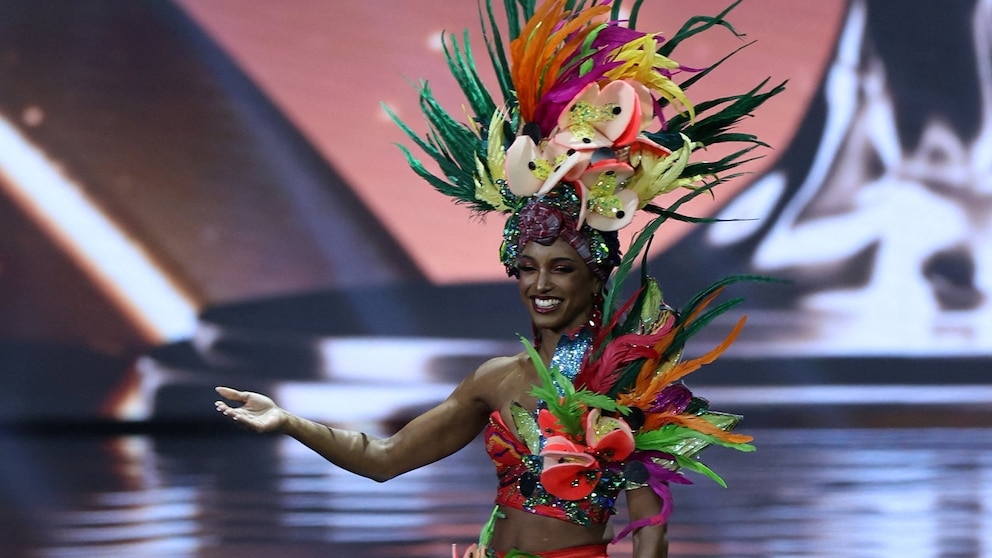Alright, let’s cut through the glittering facade, shall we? You saw the headlines: Miss Jamaica Gabrielle Henry Exits Pageant on Stretcher After Falling Off Stage. Sounds like a tragic, isolated incident, right? A slip of the foot, an unfortunate moment in the glare of the spotlight. That’s the story they’re spinning, the clean, palatable narrative for public consumption. But let me tell you, that’s just the tip of a very cold, very digital iceberg. This wasn’t just a fall; it was a screeching, pixelated alarm bell, echoing in the sterile halls of our increasingly perfected, performance-driven, tech-dominated existence.
The Official Lie: ‘Just an Accident, Folks!’
We’re fed the usual pap, aren’t we? The owner, Mr. Raul Rocha, swift to assuage the masses, assures us Miss Henry is getting the best care, that it was merely a ‘slippery start’ to the competition. Oh, a ‘slippery start’ indeed. As if the stage itself simply decided to become a treacherous ice rink at the most inconvenient moment for a young woman performing under unimaginable pressure. They’ll talk about paramedics, recovery, resilience. They’ll trot out the feel-good stories of determination. It’s all part of the show, a well-oiled machine designed to smooth over the cracks in the illusion. A brief hiccup, they’ll declare, before the pageant machine grinds back to its polished, relentless pace.
Is that really all there is to it?
The Truth: A Glitch in the Matrix of Perfection
Now, let’s peel back the layers of digital veneer, because what happened to Miss Jamaica wasn’t just an accident; it was a brutal, physical manifestation of the impossible standards we’ve engineered, amplified, and enforced through our relentless pursuit of technological ‘perfection.’ This whole spectacle, these beauty pageants, they’ve always been a bit of a grim spectacle, commodifying women into perfectly packaged dolls. But in the age of high-definition cameras, instant global virality, and the algorithmic gaze, it’s taken on a truly dystopian flavor.
Think about it. Every single angle is captured, every pore scrutinized, every movement dissected. There’s no room for error, not when an army of AI-powered lenses and a billion human eyeballs are watching, waiting for the smallest imperfection. The pressure to present an unblemished, hyper-real version of oneself is immense, a crushing weight that would make even the strongest among us buckle. So, when Miss Jamaica tumbles, it’s not just her physical body failing; it’s the human element itself, glitching under the relentless demands of a system that wants flawless, inhuman performance.
The Algorithmic Hunger for Drama
Let’s not be naive. This ‘shocking footage’ of Miss Jamaica’s fall didn’t just passively exist; it exploded. It went viral. Why? Because algorithms, those insatiable digital beasts, thrive on drama, on spectacle, on anything that generates ‘engagement.’ A perfect gown walk? Mild interest. A dramatic, painful fall captured in excruciating detail? Bingo! Instant global headlines, millions of views, a torrent of clicks. Suddenly, Miss Jamaica’s misfortune becomes a profitable commodity, fodder for the digital mill, fueling the very system that demands this flawless, unattainable ideal in the first place.
Is it truly an accident when the system benefits so immensely from the very ‘accidents’ it implicitly encourages by setting such impossible benchmarks? What if, dare I say, the ‘slippery’ stage wasn’t just poor maintenance, but a subtle, perhaps unconscious, nod to the idea that a little drama spices up the show? We live in an age where manufactured authenticity sells. Viral moments, even painful ones, drive narratives and, more importantly, revenue. This isn’t just entertainment; it’s a meticulously engineered performance for the global digital stage, where even the mishaps become part of the perverse spectacle.
The Tech Billionaire’s Plaything: Beauty as Data
And who owns Miss Universe now? Raul Rocha. A businessman. What does it mean when these deeply human spectacles, steeped in tradition, are acquired by individuals whose primary expertise lies in efficiency, scalability, and, let’s be honest, monetization? They don’t see aspiring young women; they see data points, market segments, opportunities for ‘disruption.’ The beauty pageant, once a community affair, is now a global brand, optimized for digital consumption. Are we truly surprised when the human element, fragile and unpredictable, sometimes breaks under such pressure?
This isn’t just about a beauty pageant; it’s a microcosm of our broader society. We’re pushing human limits, physical and mental, to fit into frames dictated by algorithms and projected onto screens. From influencer culture demanding an ‘always-on’ perfection to the relentless pursuit of biometric data for health apps, we are constantly being told to optimize, to perform, to be better, faster, stronger – always in front of a lens, always for an audience. Miss Jamaica’s fall is a stark, painful reminder of what happens when the human operating system crashes under the weight of digital expectation.
A Dystopian Future of Manufactured Perfection
Where does this road lead? Imagine the pageants of tomorrow. Will human contestants even be necessary? We’re already seeing hyper-realistic AI models, digital influencers who never age, never stumble, never have a bad hair day. They are the epitome of engineered perfection, untainted by human error or emotion. Is Miss Jamaica’s fall a dark premonition of a future where true human vulnerability is systematically eradicated from public performance? Will we soon be judging holographic beauties, flawlessly generated, walking on stages that are literally impossible to slip on?
This isn’t science fiction anymore, folks. It’s happening. The drive for ‘perfection’ isn’t about human flourishing; it’s about control, about predictability, about creating a reproducible, monetizable product. And human beings, with our messy emotions, our unpredictable bodies, our inconvenient need for rest and compassion, are simply not designed for that. We are organic, beautifully flawed creatures. When we force ourselves into the digital straitjacket of unceasing performance, something has to give. And sometimes, it gives quite spectacularly, right in front of the cameras.
The Commodification of Humanity, Digitally Enhanced
Let’s not forget the insidious creep of the ‘viral moment.’ Miss Henry’s very real pain, her humiliation, became content. It became a snippet in an endless feed, a talking point, a meme perhaps. The algorithms don’t care about her well-being; they care about her engagement. This desensitization to human experience, viewed through the cold, detached lens of a screen, is one of the most dangerous side effects of our digital age. We are training ourselves to consume pain and vulnerability as entertainment, further eroding our collective empathy. Is this what we want? To turn every human struggle into a clickbait headline, every stumble into a ‘shocking video’ for mass consumption?
The history of beauty pageants is fraught with issues of objectification, but the digital age has taken it to a whole new level. It’s not just about judging beauty; it’s about manufacturing an unattainable ideal and then punishing any deviation from it, all while profiting from the public spectacle of that punishment. The pressure these young women face is not just from the judges, but from the billions of anonymous, judgmental eyes staring through their screens, ready to comment, to share, to amplify every perceived flaw or failure.
Wake Up Call: Reclaim Our Imperfection
So, the next time you see a headline about a ‘slip-up’ on a perfectly lit stage, or a ‘flaw’ exposed by a zoom lens, don’t just dismiss it as an unfortunate accident. Look deeper. See it as a symptom. See it as a stark, glaring indicator of a system that is pushing us towards a dehumanized, algorithm-driven existence where imperfection is not only discouraged but actively monetized. We need to question the very systems that create these impossible standards and then profit when someone inevitably falters. Do we really want a future where the only acceptable human is a digitally optimized, flawlessly performing one?
Miss Jamaica’s fall wasn’t just a physical misstep; it was a societal one. A collective stumble in our mad dash towards a ‘perfect’ digital future that leaves no room for the messy, beautiful reality of being human. It’s time to yank our eyes away from the screens, to embrace our flaws, to celebrate genuine human experience, and to fiercely resist the algorithms that seek to flatten us into perfectly polished, endlessly performing data points. Otherwise, we’re all just waiting for our own inevitable, very public tumble off the virtual stage.
The glittering lights of Miss Universe obscure a darker truth, one where the pursuit of an artificial ideal, fueled by technology, can break even the strongest among us. Are you watching, or are you just scrolling?


